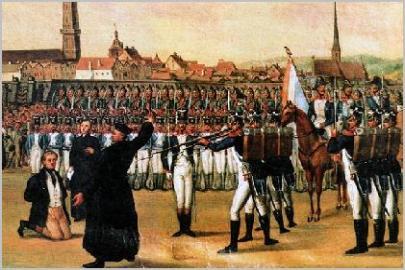
He gained command of the French army in Italy, where, after defeating the Austrians in 1797, he negotiated a Treaty which earned him widespread popularity upon his return to France. He annexed German land, and in 1801 he suggested that the larger territories be compensated by confiscating the free cities and ecclesiastical states. By 1803, 112 small states were thus seized by their neighbors. He then took an army to Egypt to hamper British shipping to India, but when it did not go as planned he abandoned his army and rapidly returned to Paris to take advantage of the situation, becoming the first of three consuls in the new government in 1799.
As First Consul, Napoleon began a program to consolidate his power, ending the dissension between France and the Church with the Concordat of 1801. Napoleon then signed the Peace of Amiens, a temporary peace with the British in 1802 after several wars. He also sold France’s Louisiana territory to the U.S.A. in 1803. He set the foundation for much of Europe’s legal system with the codification of the civil law which, promulgated in 1804, was later known as the Code Napoléon: individual liberty, freedom of work and conscience, the lay character of the state, and equality before the law; while at the same time protecting landed property and giving greater liberty to employers. His reforms were at first welcomed. However, in 1804, Napoleon dispensed with the Consulate and crowned himself Emperor, a move which caused widespread dismay and consternation.
As a precaution to maintain imperial status in the event the Holy Roman Empire should be dissolved (as indeed it was), Maria Theresa’s grandson Franz II assumed the hereditary imperial title of Emperor of Austria in 1804.
On December 2, 1805, his greatest victory came when he defeated the Russian and Austrian armies in the Battle of Austerlitz. On March 6, 1806, Franz II abdicated as Holy Roman Emperor and had to dissolve the old empire which Napoleon immediately began to dismantle. He forced 16 German states to secede from the Empire and form the Confederation of the Rhine. By the Treaty of Pressburg, Austria renounced all influence in Italy and ceded Venetia and Dalmatia to Napoleon, as well as extensive territory in Germany to his allies Bavaria, Württemberg, and Baden. The Bourbons were dethroned in the kingdom of Naples, which was given to Napoleon’s brother Joseph. Habsburg lands were now called the ‘Kaisertum Österreich.’
After the Confederation of the Rhine was founded in 1806, it soon embraced all of western Germany in a union under French protection, and Napoleon controlled almost all of Western Europe with the exception of Spain. By instituting the Continental System, under which all European ports would refuse to accept British shipments, he tried to destroy Britain’s economy, but failed. His attempts to force Spain to comply touched off the Peninsular War.
At the same time, the wide-spread German support for Napoleon’s rule begane to erode after the famous defeat of the Germans by Napoleon at the battles of Jena and Auerstadt in 1806-1807. Notables such as the Humboldts and Goethe had hailed him as the “regenerator” of Germany. But others, such as the Brothers Grimm, never saw him in that light. Napoleon had ignored the demand for independence of most of the little kingdoms, grand-duchies, margravates, principalities, baronies, electorates, free cities and villages that made up Germany and only fifty-two out of more than three hundred survived the year 1806.
Also, the cultural destruction, plundering and deplorable conduct of French troops in Germany, such as that displayed in the Palm eaffair below, added to the creation of artificial kingdoms for his brothers, turned many Germans into ardent anti-French nationalists. The depredations of the French under Napoleon as ordinary Germans were forced to feed and quarter his troops caused even more hardship and anguish than Germans had experienced earlier from the “Sun King” Louis XIV in the 17th century when his thieving, raping and pillaging troops burned every castle on the Rhine and used scorched earth tactics to lay waste to the entire region.

Palm unwittingly sent the package on to a book seller in Augsburg. Napoleon heard of the pamphlet but, failing to discover the author, had Palm arrested. He was handed over to a military commission at Braunau with orders to try him and execute him within 24 hours. Either Palm was denied the right of defense or his defense did not show up on time, but at his hearing on August 22, it was proven that he was not the author. Four other booksellers whose shops the parcel had travelled through had also been found guilty, but were granted mercy at the request of Bavarian King Maximilian I.
At 11 o’clock, on August 25, 1806, Palm’s prison door was opened. He presumed he was also going to be set free as the others had been. Instead, he was notified that he would be executed at 2 p.m. that afternoon. The townsfolk begged the French for mercy for Johann Palm, but at the appointed hour, Palm was placed on a cart and taken outside the walls of the town, his wrists bound behind his back. He was shot by a firing squad of six French soldiers.
Only one bullet hit him from the volley, and he dropped to the ground in pain. As he tried to get up, another volley was fired. Again, he fell, grievously wounded, but not dead. Two of the soldiers then ran forward and placed the muzzles of their muskets directly to his head to finish him off.
Though a devout Protestant, Palm was attended by a Catholic priest during his final hours and buried in a Catholic churchyard. The murder of Johann Palm came to symbolize French cruelty and soon outraged Germans across the land. A monument to Palm was erected in Braunau in 1866